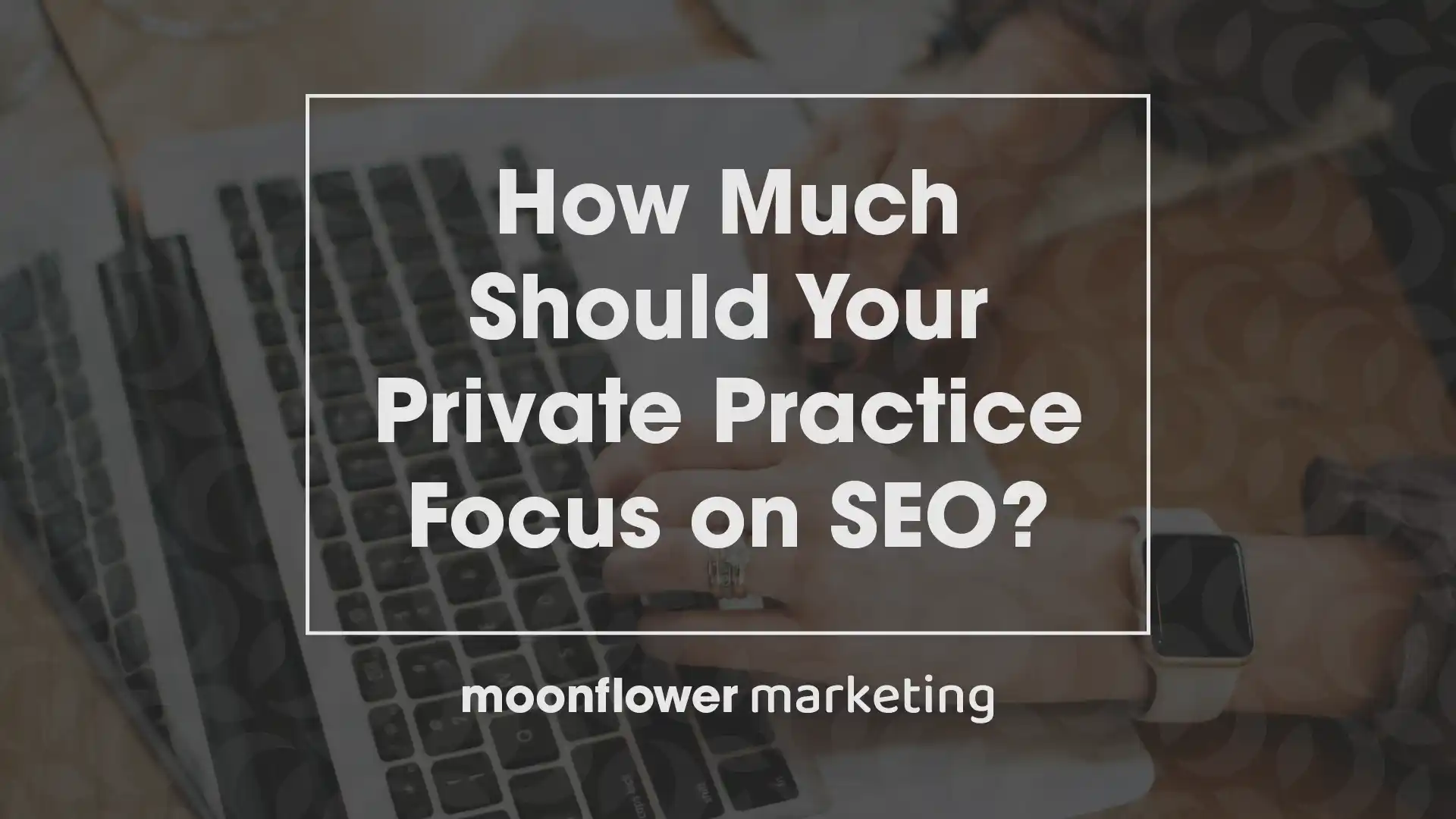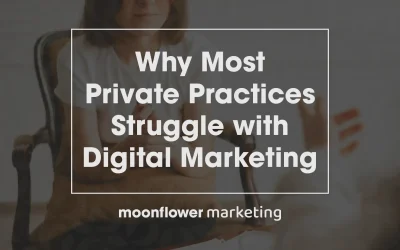SEO (Search Engine Optimization) is one of many levers you can pull as a locally-focused private practice to grow your business.
Understanding what people are searching for related to your services and showing up on the first page of search engines can be hugely beneficial (and profitable) for you.
However, we often refer to SEO as “the long game.”
Depending on your industry and local saturation of similar practices, it can be extremely difficult to show up anywhere near the first page of Google searches for quite a while.
The joke is, “Where is the best place to hide a body?
Answer: The second page of Google Search Results.
There are different kinds of SEO to consider.
- On-Page SEO – Targeting search terms related to your business.
- Technical SEO – Ensuring your website is built favorably to both users and search engines. This includes site structure and site speed, among other things.
- Local SEO – Targeting locally-focused searches for your services.
- AI Optimization – This is a newer form of SEO where you seek to show up as citations/references in either AI Summaries on search engines or queries in AI chatbots like Perplexity or ChatGPT, among others.
Each of these types of SEO can be helpful and important to varying degrees depending on the kind of practice you lead.
However, not every private practice should focus heavily on SEO. It makes more sense for some practices to dive head first into SEO than others. I’ll explain why in a minute.
First, let’s look at each type of SEO to explain what it is and how it might be helpful for your private practice.
What to Optimize for On-Page SEO
On-page SEO is an effort to optimize individual web pages to rank higher in search engines for specific search queries and, therefore, earn more quality web traffic.
Things you would optimize on an individual web page would include:
- Title Tags – Clear, keyword-rich titles that reflect the page’s content.
- Meta Descriptions – Short summaries that improve click-through rates in search results.
- Headings (H1, H2, etc.) – Structured headers that help search engines and users understand content hierarchy.
- URL Structure – Clean, descriptive URLs with target keywords.
- Keyword Optimization – Using relevant keywords naturally throughout the content.
- Internal Linking – Linking to other pages on your site to help with navigation and authority flow.
- Image Optimization – Using descriptive file names, alt text, and compressed file sizes.
- Mobile-Friendliness – Ensuring the page works well on mobile devices.
- Page Speed – Fast-loading pages improve user experience and rankings.
- Content Quality – Original, valuable, and relevant content that matches search intent.
Doing all of these helps to create landing pages, blog posts, etc., that are primed to show up higher in search results. However, it’s not a guarantee.
Remember, you’re competing with similar practices in your community, and how good or bad they are at this and how long they’ve been around impacts your results.
What is Technical SEO?
Technical SEO optimizes your website’s backend or infrastructure to help search engines crawl, index, and rank your content more effectively. This ensures your site is optimized and structured well for search engines and real users.
Some things you would optimize on the technical side of SEO would be:
- Crawlability – Making sure search engines can discover and navigate your site (using XML sitemaps and robots.txt files).
- Indexability – Ensuring important pages are allowed to be indexed and show up in search results.
- Site Speed – Optimizing load times for better user experience and rankings.
- Mobile Optimization – Ensuring the site is responsive and functions well on mobile devices.
- Secure Sockets Layer (SSL) – Use HTTPS to secure the site and build trust.
- Structured Data (Schema Markup) – Adding extra code to help search engines understand your content and enhance search results with rich snippets.
- Canonical Tags – Prevent duplicate content issues by specifying the preferred version of a page.
- Fixing Broken Links & Errors – Resolving 404 errors, redirects, and other issues affecting crawlability and user experience.
- Site Architecture – Creating a logical structure with a clear hierarchy that helps both users and search engines.
- Core Web Vitals – Meeting Google’s standards for loading, interactivity, and visual stability.
Optimizing all of these helps ensure your website runs smoothly, is easily crawled and indexed, and is user-friendly.
Local SEO For Your Private Practice
This is the most critical type of SEO to focus on for a private practice of any kind. Whether in the health and wellness or medical space, a law firm or legal practice, or a financial advisor, this is your most crucial form of lead generation (possibly second to referrals).
Local SEO is the practice of optimizing your website and online presence to ensure you show up in local searches for your services.
These are searches near your office or searches such as “dentist near me” or “Indianapolis child therapist.”
Local SEO is essential because the searcher’s intent is highly focused on hiring someone.
The more you appear in these searches, the more business you will get.
Here are some things you want to optimize when it comes to Local SEO:
- Google Business Profile (GBP) – Claiming and optimizing your listing with accurate info, categories, photos, hours, and updates.
- NAP Consistency – Ensure your Name, Address, and Phone Number are consistent across your website and directories.
- Local Citations – Listings on directories like Yelp, Bing Places, and local chambers that confirm your business info.
- Local Keywords – Using geo-specific keywords in your website content and metadata (e.g., “best dentist in Brooklyn”).
- Reviews & Ratings – Encouraging positive customer reviews on platforms like Google, Yelp, and industry-specific sites.
- Local Content – Creating content about local events, news, or community topics.
- Mobile Optimization – Ensure a fast, responsive site since many local searches happen on phones.
- Local Backlinks – Getting links from local businesses, newspapers, or community organizations.
Consistency is king here. Unfortunately, this can take a lot of time. There are tools to aid in claiming and optimizing on directories to speed up numbers one through three, but the rest takes some work.
Prioritize items one through five and then work on the others. Get as many Google reviews from happy clients as humanly possible. These are very helpful.
What is AI Optimization, and How Do I Do It?
Assuming you’ve done a Google search recently, you’ve probably seen the “AI Overview” at the top of each search.
These overviews summarize the content within the search results. Often, they make it unnecessary to click on the links below.
That could mean less traffic for your website…unless you’ve optimized for AI and appear as citations in those summaries.
In addition, many people are using chatbots like ChatGPT and Perplexity, among others, for their “Googling” these days.
It’s important to consider AI optimization when building or updating your private practice website.
Here are some things you want to consider when optimizing for AI:
- Use Clear, Structured Content
- Write in concise, well-organized formats (like FAQs, bullet points, and headings).
- Focus on answering questions directly—AI tools love straight-to-the-point, well-labeled information.
- Leverage Structured Data (Schema Markup)
- Add schema for FAQs, articles, products, reviews, etc.
- Helps AI understand and extract your content accurately.
- Cover Topics Thoroughly
- Go deep and wide on your niche—cover related subtopics to increase topical authority.
- Build content clusters (pillar pages + internal linking to related posts).
- Use Natural Language
- Write like a human, but optimize for how people ask questions (especially long-tail, conversational queries).
- Optimize for Featured Snippets
- Use question-based headings (H2/H3) with concise answers underneath.
- These are often pulled into Google’s AI summaries and used by AI tools like Perplexity.
- Maintain High E-E-A-T
- Expertise, Experience, Authoritativeness, Trustworthiness — clearly showcase credentials, cite reputable sources, and keep your content accurate.
- Keep Your Content Fresh
- AI tools favor up-to-date, well-maintained content.
- Regularly update older posts and indicate last updated dates.
- Get Referenced by Other High-Quality Sources
- AI often pulls from sites with strong link profiles and credibility.
- Earning backlinks and mentions helps raise visibility in AI datasets.
Should YOUR Practice Focus on SEO? How Much?
In short, you should definitely put at LEAST enough into SEO to cover the basic best practices, most of which are listed above.
Get your website to a point where it is primed to rank well, even if it doesn’t immediately.
Of course, there is a LOT more you can do to improve your search rankings and grow your business through SEO.
The question is, “Is it worth your time and resources?”
Well, as with most questions, the answer is, “It depends.”
Not all industries are created equal when it comes to private practice SEO.
Things like industry and location matter a LOT in determining how difficult an effort this will be.
Let’s Look at a Couple of Examples
A Personal Injury Lawyer and a Holistic Wellness Practitioner in a big city like Chicago or Indianapolis will have VERY different experiences.
Personal injury and other legal practice areas can be some of the most saturated and challenging places to gain rank.
The industry has been around for a long time. There is a TON of money being spent every day. There are many of them in every major city. Competition is steep.
Holistic Medical Practices, on the other hand, have grown in popularity over the last several years, so most practices don’t have websites that have been online since the 90s.
In addition, most Holistic Wellness websites are structured for aesthetic appeal and not so much for search engine optimization. They’re clunky, slow, and tend not to have any of the on-page or local SEO strategies needed to rank well.
So, if you’re a new Personal Injury attorney, you might want to find other ways to get clients while slowly optimizing your website over time. Ranking high in search will take a while, maybe years.
If you’re a holistic wellness practitioner, you might want to dive in heavily on SEO, with a focus on Local SEO, to start getting results within a few months.
The Bottom Line
As is often the case (unless you’re an agency trying to hardsell someone something that won’t work), the answer for whether or not you should focus heavily on SEO for your private practice is, “it depends.”
Look at your local area. Is it saturated with similar businesses? Are their websites built for ranking?
If competition is steep, get your website in good shape and then use other strategies for client acquisition.
If there isn’t much competition, put more into SEO and start snagging those little searchers to grow your practice.





0 Comments